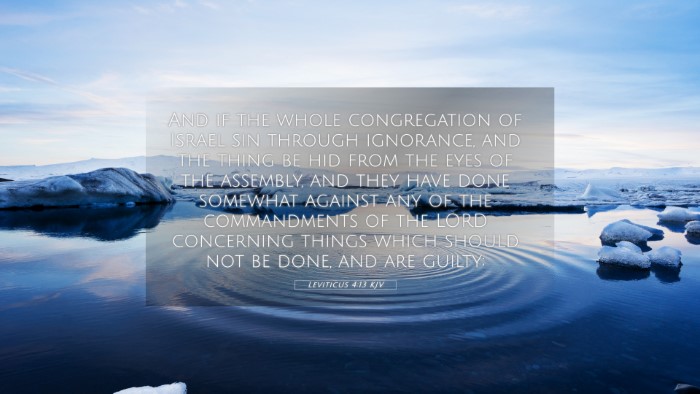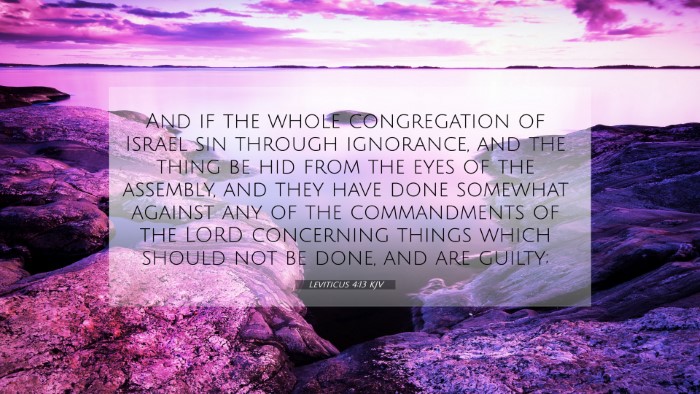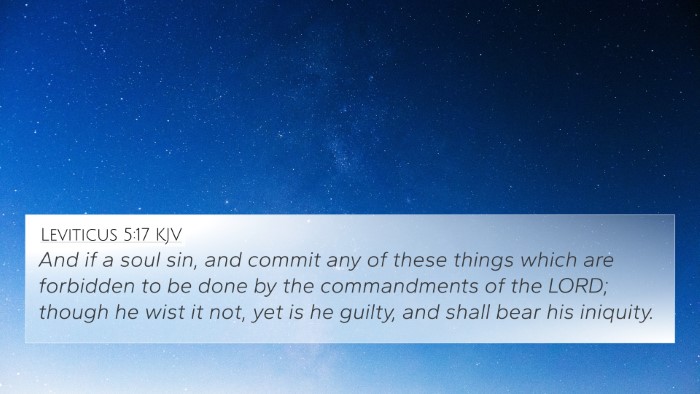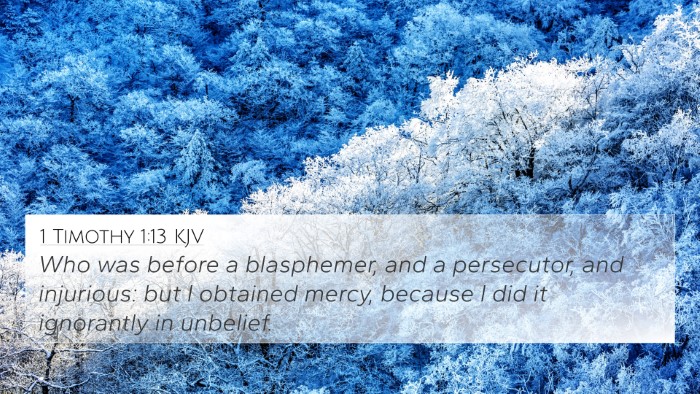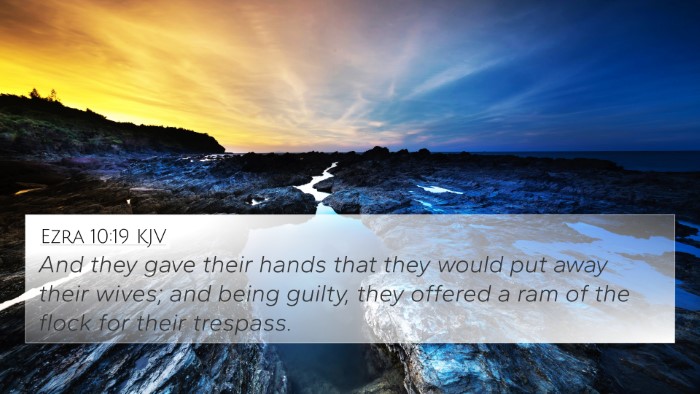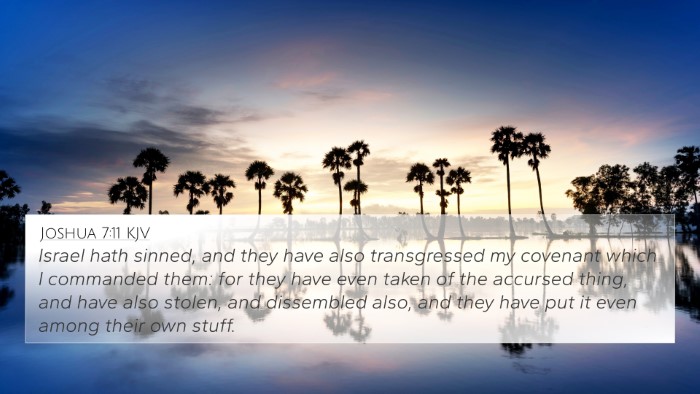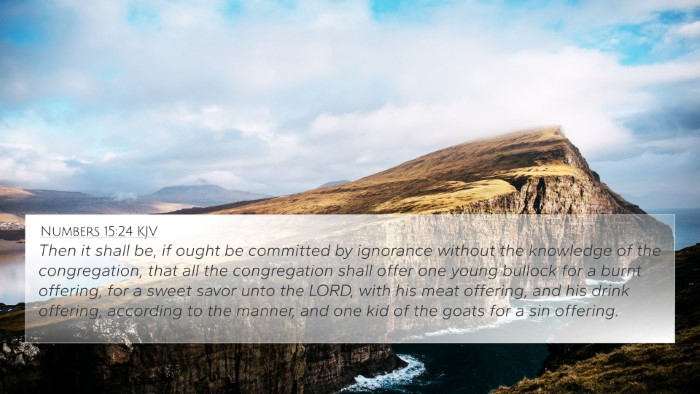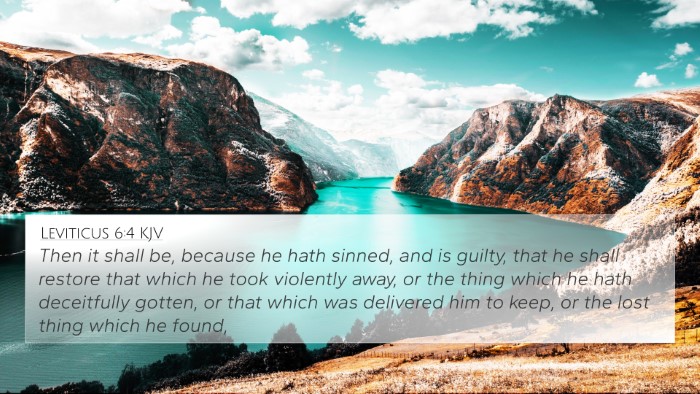Understanding Leviticus 4:13
Leviticus 4:13 states: "And if the whole congregation of Israel sins unintentionally, and the thing is hidden from the eyes of the assembly, and they have done something against any of the commandments of the Lord concerning things which should not be done, and are guilty."
Summary of Meaning
This verse addresses scenarios where the entire congregation of Israel unintentionally commits a sin. It highlights the importance of community responsibilities and collective guilt, emphasizing that even unintentional sins require atonement.
Insights from Public Domain Commentaries
Matthew Henry
Matthew Henry emphasizes that this verse illustrates the seriousness of sin, even when committed unintentionally. He notes that ignorance does not excuse guilt, suggesting that the community must remain vigilant in upholding God's commandments.
Albert Barnes
Albert Barnes remarks on the communal aspect of sin, pointing out that individual actions can impact the whole nation. He explains that even when sins are hidden from the eyes of the assembly, the collective spiritual state of the community must be acknowledged and rectified through appropriate offerings.
Adam Clarke
Adam Clarke discusses the necessity of atonement for the congregation. He notes that while the sin may not have been intentional, a clear process is required to address the guilt. Clarke stresses that God’s justice demands a response, regardless of the awareness of the sin.
Cross-References for Leviticus 4:13
- Numbers 15:24: Discusses unintentional sins and the required sacrifices for atonement.
- Ezekiel 18:30: Calls for the people to turn from all their offenses to receive forgiveness.
- Isaiah 53:6: Talks about how all we like sheep have gone astray, relating to collective sinfulness.
- James 4:17: States that knowing good and failing to do it is sin, connecting awareness and responsibility.
- Galatians 6:1: Encourages restoration of someone caught in sin, highlighting communal support.
- 1 John 1:8-9: Discusses the acknowledgment of sin and God's faithfulness in forgiving.
- Hebrews 9:22: Mentions that without the shedding of blood there is no remission, underlining the need for sacrifice for sin.
Thematic Connections
This verse serves as a foundation for understanding how individual actions influence the community, regardless of intent. It lays the groundwork for various themes such as:
- Community Responsibility: How individual actions affect collective standing before God.
- The Nature of Sin: The difference between intentional and unintentional sins and their implications.
- Atonement Practices: The necessity of sacrifices in both Old and New Testaments for sin and guilt.
Using Cross-References for Deeper Understanding
To explore the connections between Bible verses, utilize these tools and methods:
- Bible Concordance: A helpful resource for finding cross-references based on keywords.
- Bible Cross-reference Guide: Enables detailed studies of connections between verses.
- Bible Chain References: Follows themes or topics through various scriptures.
- Comprehensive Bible Cross-reference Materials: Books and online resources dedicated to biblical linking.
Conclusion
Leviticus 4:13 emphasizes the weight of sin in a communal context, showcasing the necessity for atonement even for unintentional transgressions. Through cross-referencing and a thoughtful approach to scripture, believers can gain deeper insight into the nature of sin, communal responsibility, and God's grace in forgiveness.

